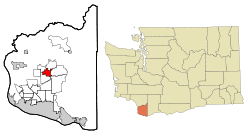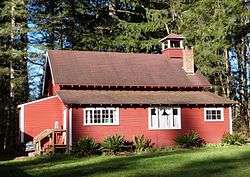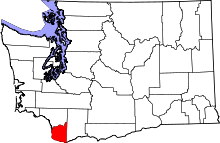Battle Ground, Washington
| Battle Ground, Washington | |
|---|---|
| City | |
|
Venersborg School in Battle Ground | |
 Location within Clark County and Washington | |
| Coordinates: 45°47′N 122°32′W / 45.783°N 122.533°WCoordinates: 45°47′N 122°32′W / 45.783°N 122.533°W | |
| Country | United States |
| State | Washington |
| County | Clark |
| Area[1] | |
| • Total | 7.16 sq mi (18.54 km2) |
| • Land | 7.16 sq mi (18.54 km2) |
| • Water | 0 sq mi (0 km2) |
| Elevation | 295 ft (90 m) |
| Population (2010)[2] | |
| • Total | 17,571 |
| • Estimate (2015)[3] | 19,407 |
| • Density | 2,454.1/sq mi (947.5/km2) |
| Time zone | Pacific (PST) (UTC-8) |
| • Summer (DST) | PDT (UTC-7) |
| ZIP code | 98604 |
| Area code | 360 |
| FIPS code | 53-04475 |
| GNIS feature ID | 1530801[4] |
| Website |
cityofbg |
Battle Ground is a city in Clark County, Washington, United States. The population was 17,571 at the 2010 census.[5] According to the Washington State Office of Financial Management, Battle Ground ranked 4th of 279 eligible incorporated communities in population growth between 2000 and 2005.[6]
History
Name
The city is ironically named for the absence of a battle. In 1855 many of the soldiers at nearby Fort Vancouver were away fighting an uprising by the Yakima Indian tribe. Nervous settlers organized a company of volunteers to guard the undermanned fort. Fearing that the friendly Klickitat Tribe on the Lewis River would join the uprising, the volunteers ordered them into the Vancouver Barracks near the fort.
When some of the Klickitats escaped, Captain William Strong, the post commander, led a detachment of volunteers to bring them back. They overtook the Klickitats near the current location of the city, but rather than engaging them in battle, Captain Strong talked them into agreeing to return to the fort peacefully. Somehow during this episode the Klickitat leader, Chief Umtuch, was slain. The circumstances of his death are unclear: some said he was killed by a soldier, others by an accidental gunshot from his own men. In any event, the Klickitats promised to return to the fort after burying their chief, a ceremony that would take several days, so Strong returned without them.
The settlers had been expecting a battle, and when Strong returned empty-handed, they accused him of cowardice. The Klickitats did return as promised, but criticism of Strong continued. The women of the fort awarded him a petticoat of many colors in mock celebration of his courage. And the area where the Klickitats were encountered became known as "Strong's Battle Ground", and later simply "Battle Ground."
Early settlement
Battle Ground was first settled in 1886 by Augustus H. Richter, who platted the town in 1902.[7] Battle Ground was officially incorporated on June 18, 1951. During early settlement in the area large numbers of people populated Fort Vancouver and locations closer to the Columbia River.
Geography
Battle Ground is located at 45°47′N 122°32′W / 45.783°N 122.533°W (45.781, -122.539).[8]
According to the United States Census Bureau, the city has a total area of 7.16 square miles (18.54 km2), all of it land.[1]' Battle Ground Schools Are Located By Place: The Battle of Captain Strong and Chief Umtuch Was fought in Tukes Valley.
(Captain Strong, Chief Umtuch and Tukes Valley ended up being schools in Battle Ground)
Demographics
| Historical population | |||
|---|---|---|---|
| Census | Pop. | %± | |
| 1960 | 888 | — | |
| 1970 | 1,438 | 61.9% | |
| 1980 | 2,774 | 92.9% | |
| 1990 | 3,758 | 35.5% | |
| 2000 | 9,296 | 147.4% | |
| 2010 | 17,571 | 89.0% | |
| Est. 2015 | 19,407 | [9] | 10.4% |
| U.S. Decennial Census[10] 2015 Estimate[3] | |||
2010 census
As of the census[2] of 2010, there were 17,571 people, 5,652 households, and 4,365 families residing in the city. The population density was 2,454.1 inhabitants per square mile (947.5/km2). There were 5,952 housing units at an average density of 831.3 per square mile (321.0/km2). The racial makeup of the city was 90.5% White, 0.8% African American, 0.8% Native American, 1.9% Asian, 0.3% Pacific Islander, 2.1% from other races, and 3.5% from two or more races. Hispanic or Latino of any race were 6.5% of the population. 15.0% were of German, 10.7% Irish, 9.9% English and 6.4% Ukrainian ancestry.[11]
There were 5,652 households of which 50.2% had children under the age of 18 living with them, 59.7% were married couples living together, 12.9% had a female householder with no husband present, 4.6% had a male householder with no wife present, and 22.8% were non-families. 17.9% of all households were made up of individuals and 7.1% had someone living alone who was 65 years of age or older. The average household size was 3.09 and the average family size was 3.53.
The median age in the city was 30 years. 34.5% of residents were under the age of 18; 9% were between the ages of 18 and 24; 29.4% were from 25 to 44; 19.2% were from 45 to 64; and 7.9% were 65 years of age or older. The gender makeup of the city was 49.0% male and 51.0% female.
2000 census
As of the census of 2000, there were 9,296 people, 3,071 households, and 2,346 families residing in the city. The population density was 2,552.6 people per square mile (986.0/km²). There were 3,196 housing units at an average density of 877.6 per square mile (339.0/km²). The racial makeup of the city was 93.81% White, 0.49% African American, 0.86% Native American, 0.72% Asian, 0.11% Pacific Islander, 1.72% from other races, and 2.28% from two or more races. Hispanic or Latino of any race were 4.14% of the population. 15.4% were of German, 11.5% United States or American, 9.4% English, 7.2% Irish, 6.1% Finnish, and 5.8% Norwegian ancestry. 94.0% spoke English, 3.9% Spanish and 1.6% Russian as their first language.
There were 3,071 households out of which 50.4% had children under the age of 18 living with them, 58.9% were married couples living together, 12.0% had a female householder with no husband present, and 23.6% were non-families. 18.2% of all households were made up of individuals and 7.7% had someone living alone who was 65 years of age or older. The average household size was 2.99 and the average family size was 3.43.
In the city the age distribution of the population shows 36.2% under the age of 18, 10.0% from 18 to 24, 32.9% from 25 to 44, 13.5% from 45 to 64, and 7.3% who were 65 years of age or older. The median age was 27 years. For every 100 females there were 95.8 males. For every 100 females age 18 and over, there were 90.5 males.
The median income for a household in the city was $45,070, and the median income for a family was $49,876. Males had a median income of $41,133 versus $25,215 for females. The per capita income for the city was $17,139. About 7.3% of families and 9.3% of the population were below the poverty line, including 11.1% of those under age 18 and 8.4% of those age 65 or over.
Events
Every year in the summer Battle Ground puts on Harvest Days. There are a number of community events including parades, street dances, a carnival and chili cook-off. Battle Ground is an almost yearly winner for the Float Best Exemplifying Community Or Civic Involvement And Pride in the Portland Rose Festival's Grand Floral Parade. In 2006, however, it received the Sweepstakes Award for Most Outstanding Float In The Parade.
Civic improvements
In June 2007, the City of Battle Ground opened a 25,000 square foot skate park downtown, and in 2009, a new 13,000 square foot library.[12]
Economy
Battle Ground is also at the epicenter of the growing Clark County wine industry with three wineries and one tasting room.
Education
Battle Ground is served by the Battle Ground School District, which includes (as of 2010):
- Amboy Middle School (Grades 5-8)
- Battle Ground High School (Grades 9-12)
- Captain Strong Elementary School (Grades 1-4)
- Chief Umtuch Middle School (Grades 5-8)
- Daybreak Primary School (Grades 1-4)
- Daybreak Middle School (Grades 5-8)
- Glenwood Heights Primary School (Grades 1-4)
- Laurin Middle School (Grades 5-8)
- Lewisville Middle School (Grades 5-8)
- Maple Grove Middle School (Grades 5-8)
- Maple Grove Primary School (Grades 1-4)
- Pleasant Valley Middle School (Grades 5-8)
- Pleasant Vally Primary School (Grades 1-4)
- Prairie High School (Vancouver, Washington) (Grades 9-12)
- Tukes Valley Primary School (Grades 1-4)
- Tukes Valley Middle School (Grades 5-8)
- Yacolt Primary School (Grades 1-4)
Alternative Schools:
- CASEE (Admin and Summit View) (Summit View – Grades 9-12)
- Community Education
- Homelink/CAM Academy (Homelink – Grades 1-12) (CAM – Grades 3-12)
Chief Umtuch Primary School, the city's oldest primary school, was demolished in 2007.
School Name Relations
Captain Strong was named after Captain William Strong (See Origin of the name "Battle Ground"). Chief Umtuch was named after Chief Umtuch (See Origin of the name "Battle Ground").
Transportation
Battle Ground is accessed from Interstate 5 at exits 9 and 11 and Interstate 205 at exit 32.
Bus services are provided by the local transit authority, C-Tran, to Downtown Vancouver, Delta Park/Vanport MAX Station, Clark College, Hazel Dell, Yacolt, and the Vancouver Mall.
Battle Ground is 18.5 miles from Portland International Airport, the closest large commercial airport.
Battle Ground is 25.5 miles from Portland, Oregon and 161 miles from Seattle, Washington.
Battle Ground has 2 different highways running in it WA 503 (Lewisville Highway/NE 117th Ave), and WA 502 (NE 219th St).
Notable people
Rob Hotchkiss, founding member of the Grammy Award-winning band, Train, lived in Battle Ground. Former MLB slugger, Richie Sexson, hails from neighboring Brush Prairie, and continues to reside in the Battle Ground area. Former MLB pitcher Gerry Staley, also born in Brush Prairie, went to Battle Ground High School.
Before 2012, actress and singer Bethany Joy Galeotti, a star of the TV series One Tree Hill, resided in Battle Ground with her husband, Enation drummer Michael Galeotti, when she was not filming in Wilmington, North Carolina.
Tonya Harding, figure skater, lived in or near Battle Ground after she retired from competitive skating and was arrested by Battle Ground police in 2002 for drunken driving and crashing her pickup in a ditch.
Jonathan Jackson, an actor from the television shows General Hospital and Nashville, among others, is from Battle Ground.
Former NBA basketball player Richie Frahm attended Battle Ground High School, before going on to play for the Gonzaga Bulldogs men's basketball team.
References
- 1 2 "US Gazetteer files 2010". United States Census Bureau. Archived from the original on 2012-01-24. Retrieved 2012-12-19.
- 1 2 "American FactFinder". United States Census Bureau. Retrieved 2012-12-19.
- 1 2 "Population Estimates". United States Census Bureau. Retrieved June 19, 2016.
- ↑ "US Board on Geographic Names". United States Geological Survey. 2007-10-25. Retrieved 2008-01-31.
- ↑ "2010 Census Redistricting Data (Public Law 94-171) Summary File". American FactFinder. United States Census Bureau. Archived from the original on 21 July 2011. Retrieved 16 September 2012.
- ↑ OFM | April 1 official population estimates
- ↑ Meany, Edmond S. (1923). Origin of Washington geographic names. Seattle: University of Washington Press. p. 15.
- ↑ "US Gazetteer files: 2010, 2000, and 1990". United States Census Bureau. 2011-02-12. Retrieved 2011-04-23.
- ↑ "Annual Estimates of the Resident Population for Incorporated Places: April 1, 2010 to July 1, 2015". Retrieved July 2, 2016.
- ↑ United States Census Bureau. "Census of Population and Housing". Archived from the original on May 11, 2015. Retrieved September 19, 2013.
- ↑ "American FactFinder"
- ↑ Harshman, Marissa. "Big Changes in Small-town Battle Ground." The Columbian. Columbian Publishing Company, 27 Feb. 2011. Web. 03 Jan. 2012. <http://www.columbian.com/news/2011/feb/27/big-changes-in-small-town-battle-ground/>.
Further reading
- Strong, Harry M., The Adventures of a Pioneer Judge & His Family, COLUMBIA Magazine: Winter 2002-03; Vol. 16, No. 4. http://www.wshs.org/wshs/columbia/articles/0402-a1.htm
- Tucker, Louise M., Battle Ground . . . In and Around, 2006. http://www.battlegroundhistorybook.com/Battle_Ground..._In_and_Around/Home.html
External links
- Official website
- History of Battleground at HistoryLink
- Battle Ground Businesses and Community Groups
- Battle Ground Chamber of Commerce
- The Reflector Battle Ground's weekly newspaper
- Battle Ground Public Schools

